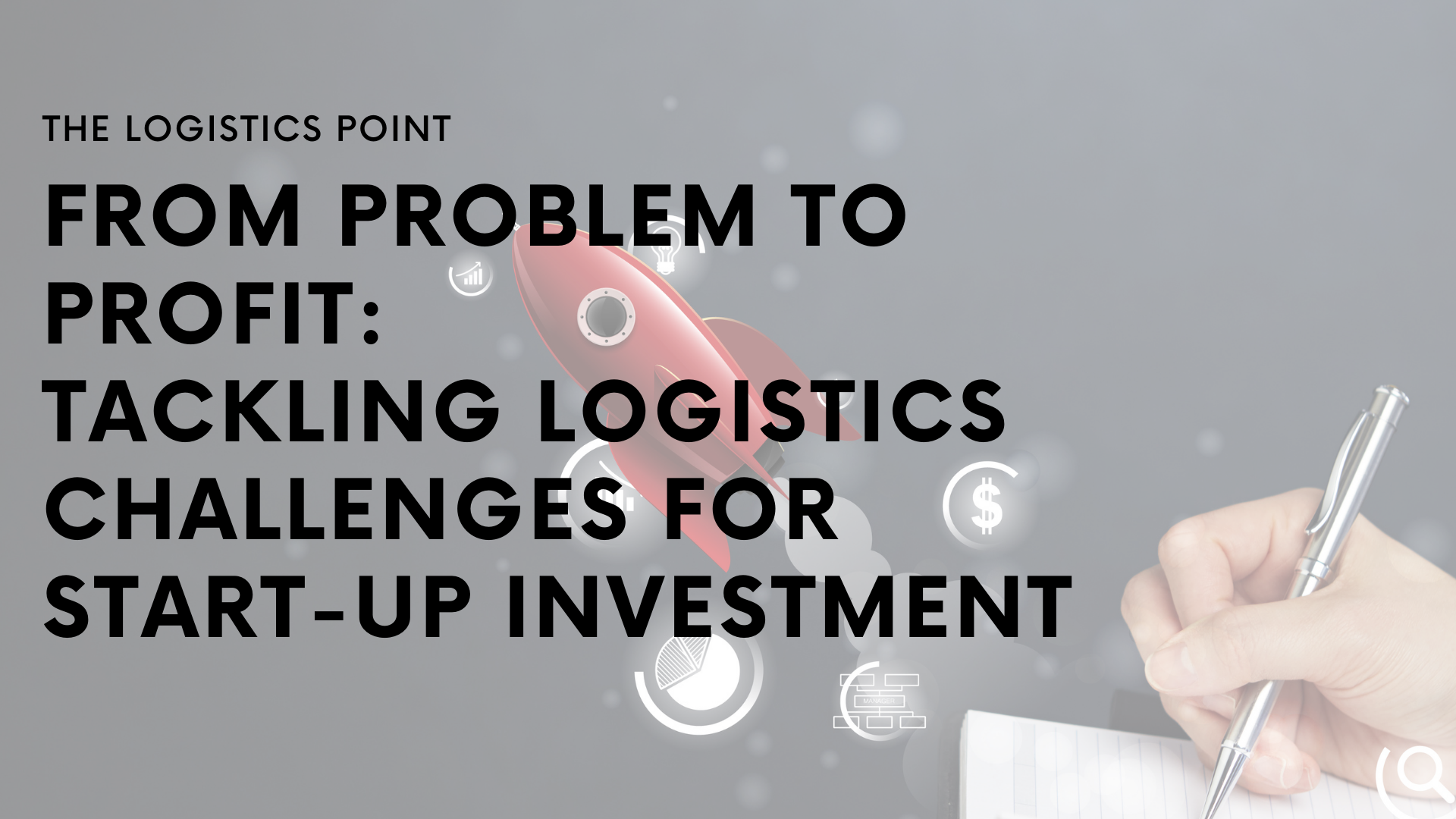When we talk about logistics and supply chain operators, we’re really talking about a tough business. Start-ups looking for funding should really get to know the industry they want to join and its challenges. If they can show they understand how to solve these problems, they’ll have a better chance of getting investment. In this feature we take a look at how investors see the industry, is there really profitability and what tech companies need to be careful when entering the logistics space. Read more from our April edition here!

“Don’t pitch to everyone under the sun. Spend some time researching and finding those investors that align with your business strategy. It’s important to maintain transparency and honesty throughout the fundraising process to build trust and credibility with investors,’’ says Tristan Thomas, CEO and co-founder of Packfleet when asked what mistakes startups make.
The logistics industry tends to move at a steady pace. It’s known for being complicated and cautious, which can make it tough to introduce new ideas, even if they’re great ones.
Plus, getting these projects off the ground often requires a big initial investment in technology, infrastructure, and hiring. If you’re aiming to shake things up in logistics, it’s important to grasp where those involved are coming from so you can address their concerns effectively.
‘’Everything comes down to being able to understand and communicate your story with all different kinds of people. In the early days of a start-up, that means transforming an idea that’s sometimes barely even formed into a story that ignites people’s imagination and gets them invested. Stories make people care,’’ tells us Marc Gorlin, the Founder and CEO at Roadie.
‘’You need to know the market that you are operating in. You need to be able to articulate the challenges that the industry is facing and how your technologies or services address those challenges.
Also, you need to be able to highlight how you stand out from any potential competitors,’’ adds Andrei Danescu, CEO and co-founder, Dexory.
Start-up organisations thrive on innovation. The more groundbreaking and inventive your product is, the greater your chances for investment. Make sure to highlight your unique technologies, business models, or innovative solutions to industry-wide challenges.
However, technology is just one piece of the puzzle. You also need to demonstrate that you have a capable team in place to execute both the product and business strategy. The stronger your team, the more opportunities you’ll attract.
Lastly, it’s crucial to “show your work.” If you’re an early-stage start-up, demonstrate that your product or service works through successful pilots. Early customer interest is a powerful indicator of potential for investors. For later-stage start-ups or scale-up businesses, showcase customer deployments, financial stability, and a long-term business plan for both product development and profitability.
How interesting is investing in logistics?
The last mile delivery market in the UK is booming, valued at over £14 billion, and London alone sees around 500 million parcels delivered each year. As the sector continues to expand, there’s a growing call for more sustainable delivery options. Online shoppers are becoming increasingly aware of the environmental impact of deliveries, and a vast majority of Londoners are eager for greener delivery solutions. This is only one of the reasons why many are optimistic about how interesting for investors the sector is.
‘’Especially with the ongoing surge in e-commerce and the growing demand for efficient and sustainable solutions, the sector is profitable enough to be interesting,’’ answers Marc. However, given the sector’s competitiveness, startups need to bring something fresh to the table.
The logistics market is becoming increasingly attractive to investors for several reasons. Firstly, the high cost of capital is prompting companies to seek alternative solutions for their supply chain infrastructure, leading to a surge in outsourcing. Secondly, advancements in software, AI, and data analytics are enhancing visibility and efficiency across supply chain operations, making outsourcing more appealing.
‘’Companies are drawn to the cost savings and flexibility offered by outsourcing, such as improved working capital management and reduced inventory carrying costs. This shift towards outsourcing allows companies to maintain financial flexibility and better allocate resources,’’ comments Todd Bremer, vice president of consulting at GEP.
Making it appealing
For startups entering the logistics space, it’s crucial to demonstrate how they can assist companies in cutting operational costs and expanding their market presence. A significant portion of logistical expenses goes towards personnel, including drivers and office staff, who often command substantial salaries. High turnover rates further complicate matters, adding to the challenge of retaining experienced employees and managing internal operations effectively. Innovations that address these challenges stand a good chance of success in the industry.
However, it’s important to note that logistics operators tend to be hesitant about adopting new technology. Therefore, any innovations must be user-friendly and come with low operational costs to gain widespread acceptance. As companies seek to invest in streamlining operations and reducing costs, they will prioritise solutions that offer a clear return on investment and total cost of ownership calculations. Striking the right balance between innovation and cost-effectiveness will be key to success in the logistics market.
Neglecting to craft a robust business plan and clear financial projections can severely hamper the prospects of startups. When presenting to investors, it’s essential to go beyond highlighting innovation and demonstrate how it translates into profitability. Rather than inventing solutions in search of problems, focus on addressing existing business challenges.
Moreover, it’s vital to recover swiftly from setbacks. Spending excessive time dwelling on mistakes or uncertainties can be more detrimental than the errors themselves. Embrace failure as a natural part of the entrepreneurial journey. The key lies in embracing failures as learning opportunities, swiftly adapting, and continuing to progress forward. Remember, resilience is key to success in the startup world.
Investors be ready
‘’2024 looks like it will follow the trend of 2023, where robotics and AI technologies are still generating a lot of buzz and investment.
However, that doesn’t mean that investors are going to throw money at any company that says that they offer AI and robotics solutions. Investors will be looking at how the products fit the market demand, but also at the evidence of the problem that the solution addresses,’ explains Andrei.
Investors are on the lookout for companies and technologies capable of rapid scalability, enabling them to seize market share swiftly and outpace competitors. Moreover, they are constantly seeking out groundbreaking technologies that can redefine entire industry categories.
Crucially, investors prioritise finding the perfect match for their portfolio. They carefully assess how your product aligns with their investment strategy and seek synergies that promise a mutually beneficial partnership. It’s about finding the right fit that ensures success for both parties involved.
‘Because no one has a crystal ball, most investors support a number of companies and technologies to increase their likelihood of success. What works well in supply chain and procurement is evaluating software companies based on the underlined market demand for their solutions, the proprietary technology, leadership, industry knowledge, and client roster, adds Todd.
As an investor talk to lots of people – listen to both praise and criticism and earnestly hear out all the feedback. Take the time to figure out who the competition is and talk to them, too. All of the details matter when your money is on the line, so make sure you do your due diligence.
‘’Also, asking yourself if you are investing in the right team is essential. Is there a team? Who is on the board of advisors? I suggest that any investor spend time with the management after vetting the idea. It’s important to understand who they are and what makes them tick. Are they after quick gains, or are they in it for the long run? How much relevant experience is there? How much skin in the game is there? All of these questions will give investors clear answers when looking for the right product and idea to invest in,’ finishes Sascha Dobbelaere, CEO at Tweave.



